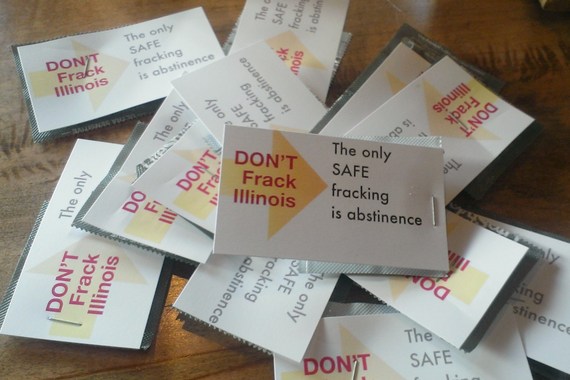Nearly half of Illinois voters oppose fracking, according to a new poll by the Simon Institute. The statewide poll reveals 48.6 percent oppose fracking while only 31.8 percent believe it should be encouraged, even if there are economic benefits. Opponents outnumber supporters in all regions of the state, including downstate where fracking is promoted as a jobs plan.
The numbers reinforce that fracking is one of the issues which cost Governor Pat Quinn support among Democrats and independents in his losing re-election campaign. Illinois Democratic voters overwhelmingly oppose fracking with 61.9 percent against and 19.7 percent in favor. Independents oppose it as well, with 48.3 percent against and 30.6 percent in support.
Any Illinois candidate looking for support from young voters should stand against fracking. A whopping 74 percent of 18-24 year-olds don't want it.
A solid 54 percent majority of Chicago residents are opposed. That's a bad sign for Rahm Emanuel who claims his aggregation deal is a clean energy victory, even though it powers Chicago with natural gas from the Marcellus shale fracking fields.
An election analysis released in January by the Paul Simon Public Policy Institute identified low turnout among Democrats, and downstate opposition as reasons for Governor Pat Quinn losing re-election. During the campaign Quinn faced protests against his support for fracking, and as this poll shows, his position is unpopular among the Democratic base. With neither candidate for Governor taking a position against fracking, it left little reason for concerned voters to show up on election day.
There's no issue for which politicians and lobbyists in the statehouse bubble are more out of touch with Illinois voters than on fracking.
After a bill to regulate and launch fracking passed the Illinois legislature, industry lobbyists launched a campaign to portray opponents as a tiny fringe. Overwhelming public outcry against fracking at public hearings provided a reality check. A few accommodating statehouse green groups helped reinforced the false impression that regulation is a consensus middle ground. The Simon poll shows industry claims that fracking opposition is limited to a small group are outrageously false.
Some statehouse Democrats are still out of touch. Central Illinois Senator Dave Koehler recently introduced an amendment to the Illinois Clean Jobs bill that would allow some utilities to pay for converting coal plants to natural gas with a new fee charged to customers. The act creates a market-based carbon auction that may push coal plant operators to make minor upgrades or convert to natural gas. Koehler's amendment would help utilities to keep aging, polluting plants running at ratepayer expense rather than investing in new clean energy.
Most Illinois fracking is on hold, at least temporarily, due to low oil prices. Yet, the issue could play a role in the 2016 election, particularly in Democratic primaries for U.S. Senate and Congress. Although some Democrats, like Pat Quinn and former Colorado Senator Mark Udall, have supported fracking regulation as a compromise middle crowd, it's a position that alienates voters on both sides of the issue while gaining support from no one but industry donors. Democratic candidates in a competitive primary would be smart to support a ban on fracking.
The poll question adopts a "jobs v. the environment" narrative which assumes fracking would benefit the economy. But, many residents oppose fracking because they don't believe another boom and bust extraction cycle will help the downstate economy. Most people don't want to locate their business or home in a community with poisoned water and air.
Low oil prices and public opposition provide an opportunity for downstate Illinois to build a healthy economy without the destructive impacts of fracking. As the poll shows, many voters are looking for leaders who offer more than empty assurances that regulation will make fracking safe or provide good jobs.

